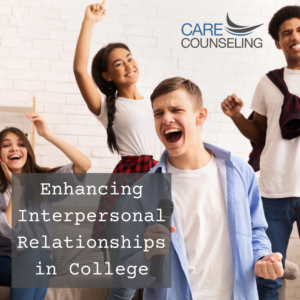Enhancing Interpersonal Relationships in College
 College is not just about academic growth; it’s also a time for personal development, self-discovery, and forming meaningful connections with others. Building strong interpersonal relationships during your college years can enrich your experience, provide support, and lay the foundation for lifelong friendships. In this blog post, we will explore strategies and tips for enhancing interpersonal relationships in college.
College is not just about academic growth; it’s also a time for personal development, self-discovery, and forming meaningful connections with others. Building strong interpersonal relationships during your college years can enrich your experience, provide support, and lay the foundation for lifelong friendships. In this blog post, we will explore strategies and tips for enhancing interpersonal relationships in college.
- Be Approachable and Open
One of the first steps to forming meaningful connections is to be approachable and open. Smile, make eye contact, and be receptive to meeting new people. Approach others with genuine curiosity and an open heart. A friendly and approachable demeanor can make it easier for others to connect with you.
- Join Clubs and Organizations
College campuses are teeming with clubs, organizations, and groups catering to various interests and hobbies. Joining clubs related to your passions or trying something new can lead to meeting like-minded individuals. Shared interests provide a natural conversation starter and help create a sense of belonging.
- Attend Social Events
Participate in social events and gatherings organized by your college or student groups. Whether it’s a mixer, a game night, or a campus-wide festival, these events offer opportunities to meet people outside your regular social circle. Don’t be afraid to strike up conversations and introduce yourself.
- Practice Active Listening
Good communication is at the heart of strong interpersonal relationships. Practice active listening by giving your full attention when someone is speaking to you. Show empathy and ask questions to demonstrate your interest in their thoughts and feelings. People appreciate being heard and understood.
- Be Authentic
Authenticity is the key to forming genuine connections. Be yourself, and don’t try to be someone you’re not to fit in or gain approval. Authenticity allows you to attract people who appreciate you for who you are, not who you pretend to be.
- Engage in Group Projects
College often involves group projects as part of coursework. Embrace these opportunities to collaborate with peers. Working together on assignments fosters teamwork, communication skills, and the chance to get to know your classmates better.
- Respect Differences
College campuses are diverse, with students from various backgrounds, cultures, and experiences. Embrace and respect these differences. Learn from others’ perspectives, and be open to understanding different viewpoints. Diversity enriches your college experience and broadens your horizons.
- Resolve Conflicts Constructively
In any relationship, conflicts may arise. How you handle these conflicts can significantly impact the strength of your interpersonal relationships. Practice constructive conflict resolution by addressing issues calmly, listening to the other person’s perspective, and working toward a mutually satisfactory solution.
- Build Trust Gradually
Trust is the foundation of any strong relationship. Building trust takes time and consistency. Be reliable, keep your commitments, and be there for others when they need you. Over time, trust will naturally develop.
- Balance Independence and Dependence
In college, it’s crucial to find a balance between independence and dependence on others. While forming close bonds is essential, it’s equally important to maintain your individuality and not become overly reliant on any one person or group. Nurture your independence while valuing your connections.
- Show Appreciation
Express gratitude and appreciation for the people in your life. A simple thank-you note, a kind gesture, or a heartfelt compliment can go a long way in strengthening your relationships. Let others know that you value their presence and contributions.
- Be a Supportive Friend
Supporting your friends during both the good times and the bad is a vital aspect of building strong relationships. Be there to celebrate their successes and offer a listening ear during their struggles. Acts of kindness and support can solidify your friendships.
- Stay Connected Beyond College
As college years come to an end, make an effort to stay connected with the friends you’ve made. Exchange contact information, plan reunions, and use social media to stay in touch. Lifelong friendships often begin in college, and maintaining those connections can be incredibly rewarding.
- Seek Counseling or Guidance
If you’re facing difficulties in forming and maintaining relationships due to personal challenges or mental health issues, don’t hesitate to seek counseling or guidance from your college’s counseling center or a mental health professional. They can provide valuable insights and support.
Enhancing interpersonal relationships in college can greatly enrich your academic journey and personal growth. Whether you’re forming friendships, collaborating on projects, or navigating the complexities of diverse perspectives, these relationships are an integral part of your college experience.



























